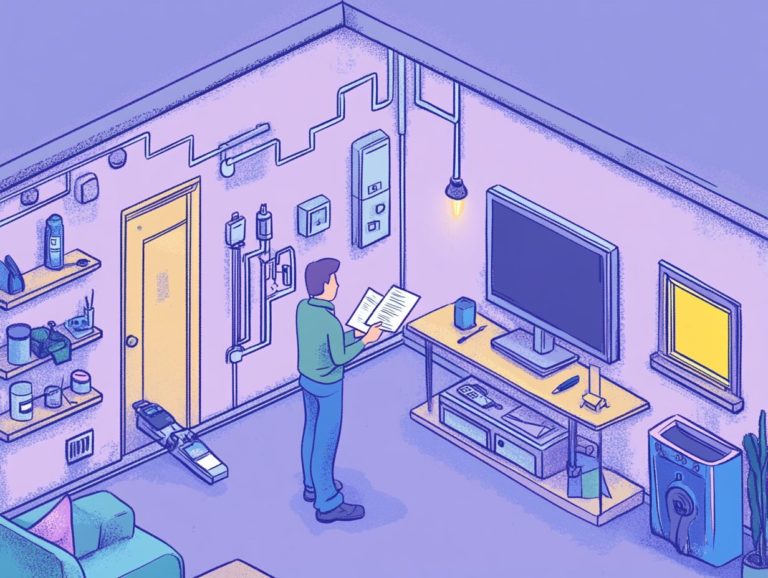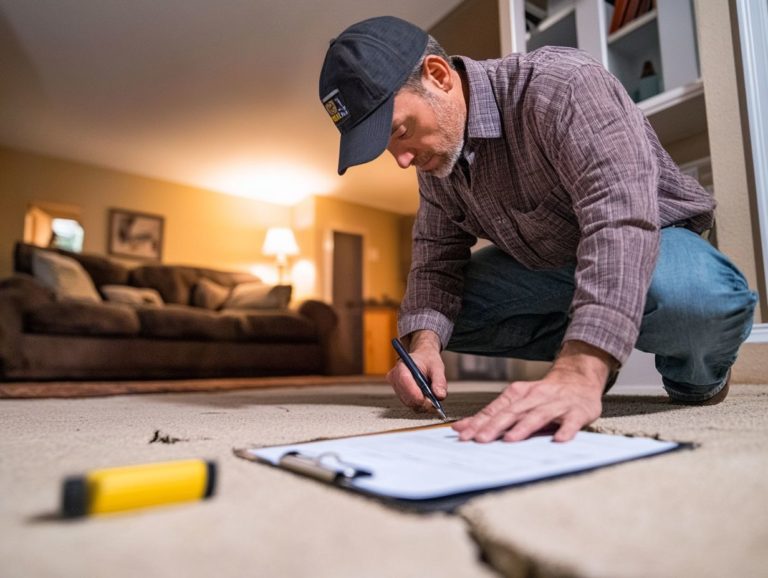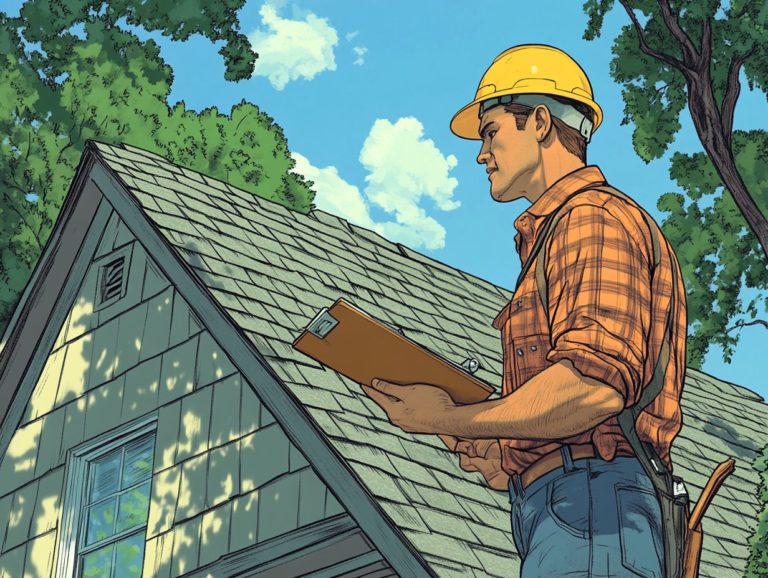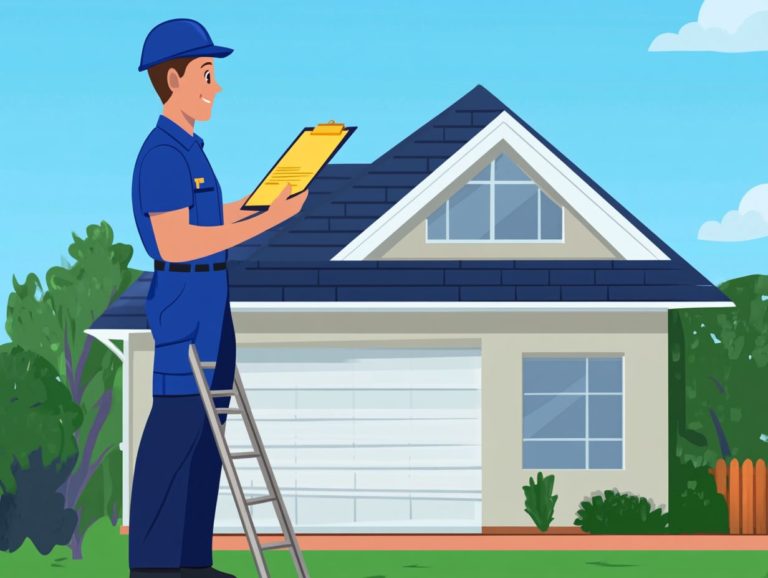The Importance of Home Inspections for Buyers
Buying a home is one of the biggest decisions you’ll make. Make sure you invest wisely!
Home inspections are essential for your journey. They reveal potential issues before you finalize the deal.
In this article, you ll discover why home inspections are crucial, what to expect during the process, common problems to watch for, and valuable tips for selecting a trustworthy inspector.
We will also explore strategies to negotiate repairs effectively.
Understanding these elements will equip you to navigate your home-buying journey with confidence and assurance.
Contents
Key Takeaways:
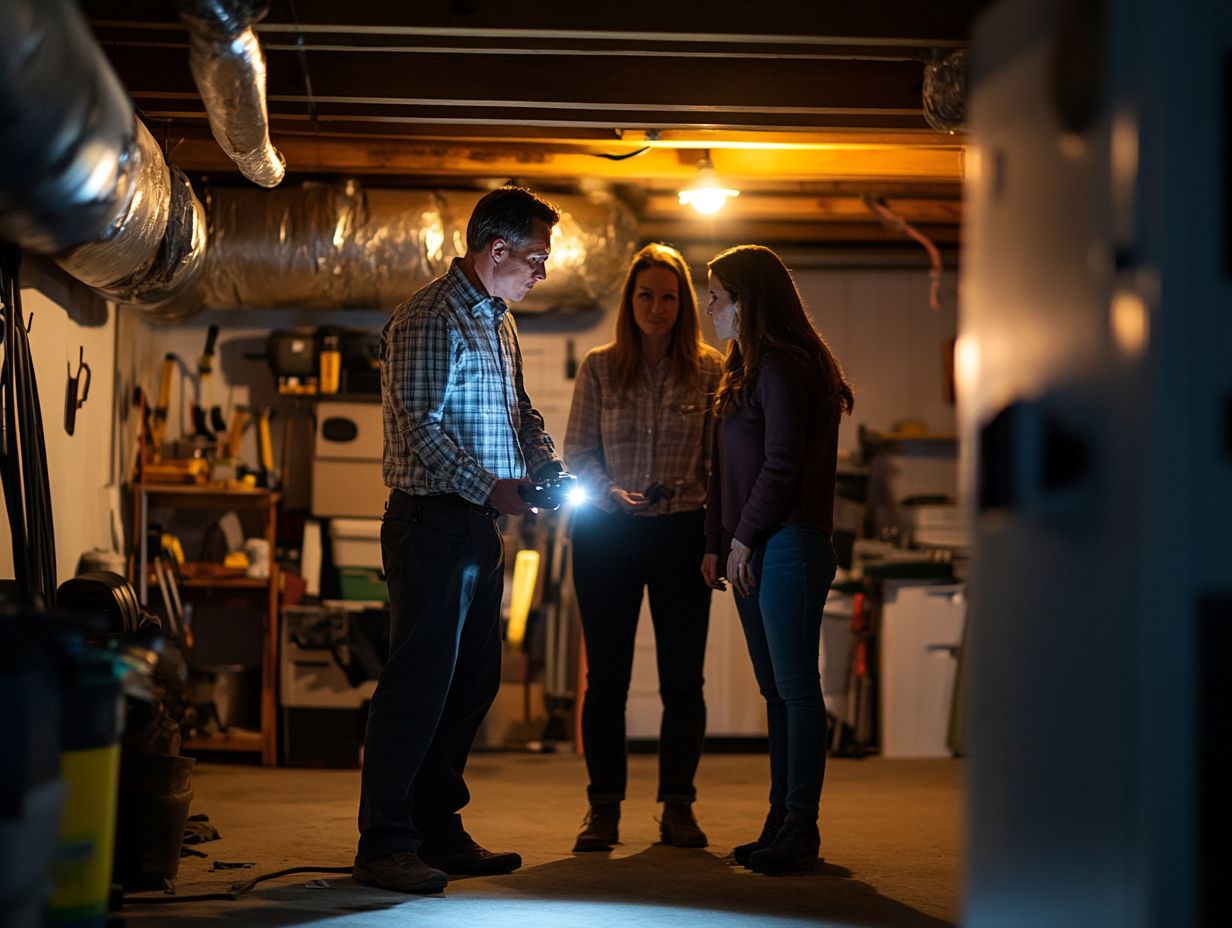
- Home inspections are crucial for buyers!
- They provide valuable information about the condition of a property and any potential issues that may need to be addressed.
- During a home inspection, buyers can expect a thorough examination of the property, including its structural components, electrical systems, and plumbing.
- Common issues found, such as mold, faulty wiring, and structural damage, can serve as red flags for buyers and may require further negotiation with the seller.
The Role of Home Inspections in the Buying Process
Home inspections are vital in the real estate buying process, serving as an essential safety net for you as a potential buyer. Understanding the importance of pre-purchase home inspections can help you steer clear of costly restoration projects and hidden issues that could lead to buyer’s remorse.
A thorough inspection evaluates the entire property, providing you with a clear understanding of the home’s condition, including potential problems like structural issues, pest infestations, or electrical malfunctions.
This detailed evaluation empowers you to make informed decisions and strengthens your negotiating position, making it an essential step in your home-buying journey.
Why Home Inspections are Important for Buyers
Home inspections are essential for you as a buyer, highlighting the importance of home inspections for buyers and helping to uncover potential issues that could lead to expensive repairs or safety concerns in the future.
By examining various categories like structural integrity, plumbing, electrical systems, and roofing, these assessments provide a comprehensive evaluation that reveals hidden problems.
This detailed reporting arms you with crucial information, empowering you during negotiations about the property’s price and necessary repairs.
Having a thorough inspection report acts as a safeguard, highlighting the importance of home inspections in real estate to ensure that any required repairs are addressed before you finalize your purchase.
Ultimately, understanding the condition of a home before making a commitment can save you from future financial headaches and significantly enhance your peace of mind.
What to Expect During a Home Inspection
During a home inspection, you can anticipate a thorough evaluation of the property carried out by a qualified home inspector. They will meticulously assess various aspects, including Heating, Ventilation, and Air Conditioning (HVAC) systems, electrical outlets, and structural integrity, all while following a detailed inspection checklist to ensure nothing is overlooked.
This process usually takes a few hours, depending on the size and complexity of the property, and is essential for revealing any hidden issues that could impact the home’s value or safety.
The Inspection Process: Step-by-Step
The home inspection process unfolds systematically, where various home systems are carefully evaluated think foundation checks, roofing, plumbing, and electrical systems to ensure the safety and functionality of your property.
This meticulous evaluation kicks off with an initial walk-through, providing inspectors with a comprehensive overview of your home s condition. They diligently examine structural components and assess them for signs of wear or necessary repairs.
As the inspection progresses, each system comes under detailed scrutiny; for example, roofing concerns might hint at potential leaks, while plumbing assessments can uncover hidden pipe issues.
A thorough evaluation is crucial, as it can significantly influence both repair costs and your home insurance prospects. Ultimately, the detailed findings culminate in a final report, arming you with essential insights for well-considered choices and ensuring that any necessary repairs can be addressed proactively.
Common Issues Found During Home Inspections
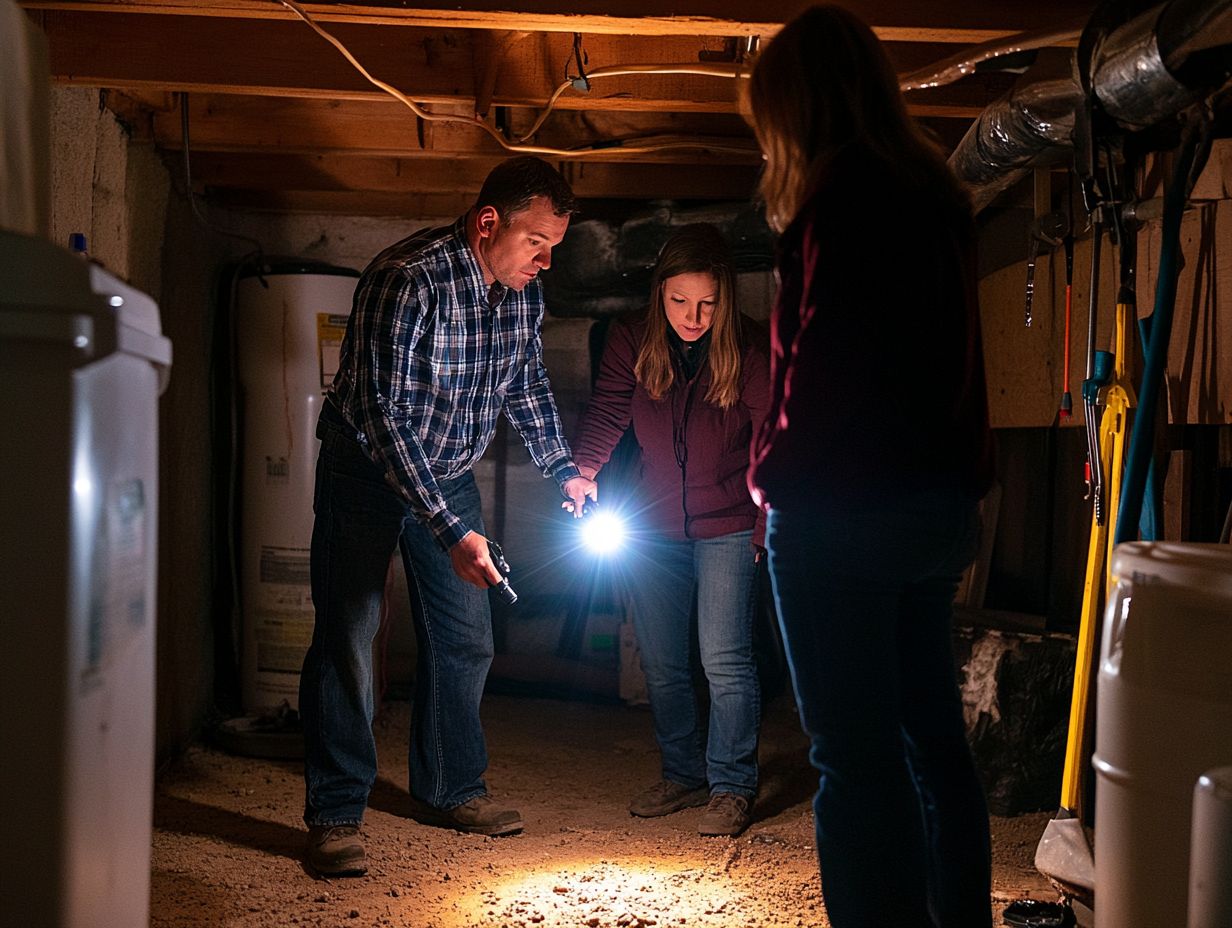
Home inspections frequently uncover prevalent issues like mold, foundation concerns, and pest infestations. These can substantially affect the safety and value of a property.
By identifying these issues early, you empower yourself to make informed decisions and negotiate repairs confidently, ultimately minimizing the risk of buyer’s remorse.
Potential Red Flags for Buyers
Identifying potential red flags during a home inspection is essential. These issues can pose safety risks or signal hidden structural issues that may impact the property’s value.
Pay particular attention to signs of electrical issues, such as outdated wiring or lights that flicker. These not only present fire hazards but can also lead to expensive repairs down the line.
Water quality concerns, like unusual discoloration or odd odors, might hint at plumbing problems that could affect both your health and the home’s integrity.
Signs of pest infestations, like droppings or chewed surfaces, can lead to higher maintenance costs.
Recognizing these red flags empowers you in the negotiation process, allowing you to request necessary repairs or adjust your offer accordingly.
How to Choose a Reliable Home Inspector
Choosing the right home inspector is crucial for your peace of mind! Their expertise is instrumental in revealing potential issues and safeguarding your interests as a buyer, highlighting the importance of home inspections for property buyers.
When choosing an inspector, take into account their credentials, experience, and commitment to guidelines established by reputable organizations such as the National Association of REALTORS or InterNACHI.
Factors to Consider in Choosing an Inspector
When selecting a home inspector, carefully evaluate their qualifications, experience, and familiarity with the specific inspection checklist relevant to your property type.
This step guarantees that the inspector has a solid grasp of essential home systems like plumbing, electrical, and HVAC, which stands for heating, ventilation, and air conditioning, crucial for home comfort.
Verify the inspector’s credentials by checking for certifications and licenses, and review their past work. Gathering recommendations from trusted real estate agents can provide invaluable insights, as they often have firsthand experience with various inspectors.
A thorough evaluation protects you from unexpected repairs and financial surprises, highlighting the importance of home inspections in real estate deals, ultimately leading to a more secure and confident home-buying experience.
Negotiating Repairs After a Home Inspection
Negotiating repairs after a home inspection is a pivotal moment for you as a buyer. Here, you can skillfully leverage insights from the inspection report to request essential repairs or concessions before sealing the deal.
This process gives you the power to tackle potential issues upfront and helps you mitigate future risks associated with expensive restoration projects.
Strategies for Addressing Issues with the Seller
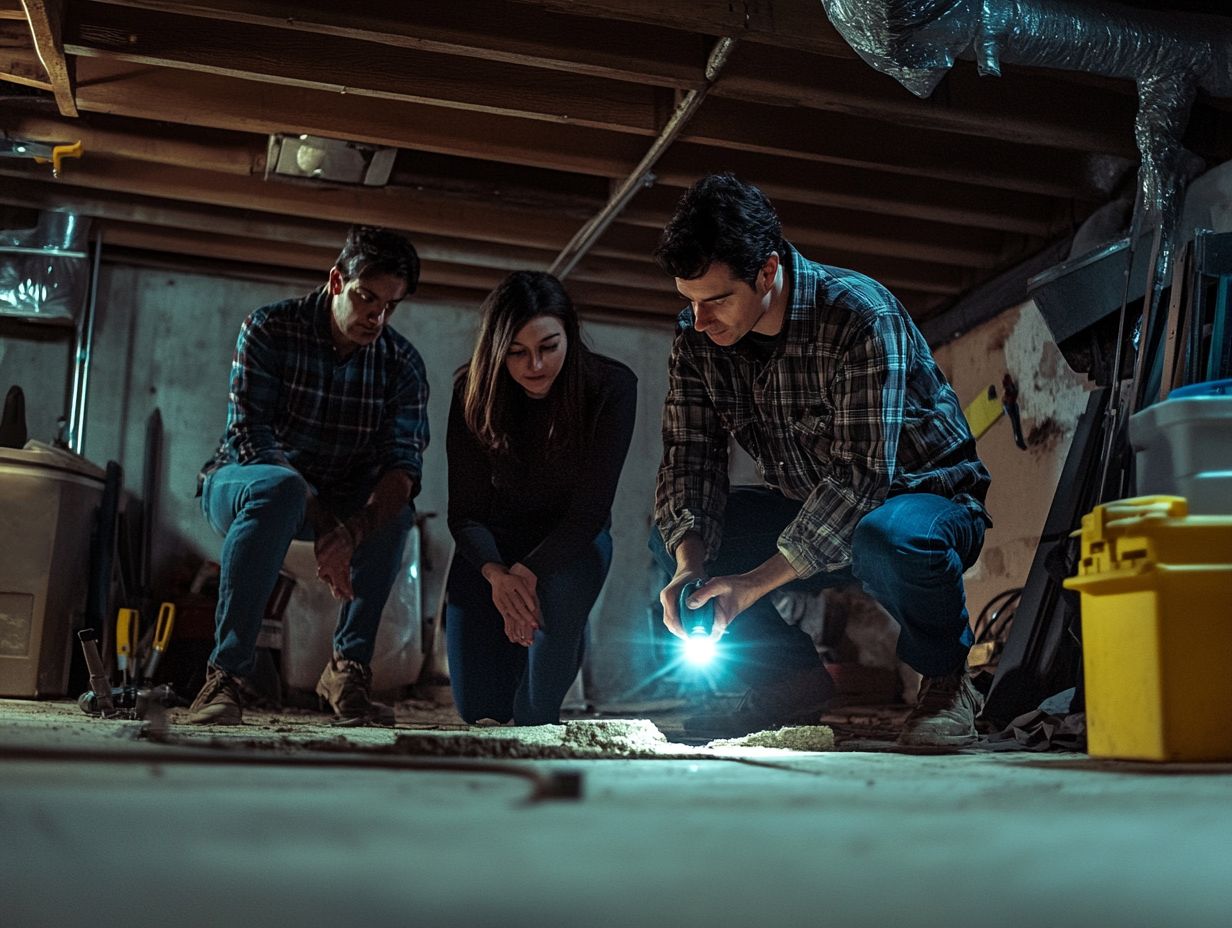
Effective strategies for addressing issues with the seller hinge on clear communication and an informed approach, ensuring you fully grasp your rights and the seller’s obligations from the inspection evaluation.
To navigate this critical phase successfully, begin by meticulously reviewing the inspection report and highlighting key areas that demand attention. Presenting these findings to the seller in a professional manner can set the stage for constructive dialogue.
It’s also wise to suggest reasonable repair options or propose price adjustments that reflect the necessary work needed to restore value. This transparent exchange fosters trust and emphasizes the importance of buyer protections.
Understanding the negotiation landscape enhances your opportunities to secure favorable terms, ultimately safeguarding your investment for the long haul.
Ready to find your dream home? Start your inspection journey today!
Other Considerations for Buyers
Along with home inspections, you should thoughtfully consider several factors that can impact your purchasing decisions, including understanding the importance of home inspections.
Pay attention to property disclosure requirements, the availability of home warranties, and the overall costs associated with inspections. Each element is important for your confidence in the investment.
Additional Factors to Keep in Mind During the Home Buying Process
Stay aware of buyer protections, different types of home insurance, and the competitive market landscape that can influence your purchasing power.
These elements significantly impact the outcomes of your investment.
Understanding buyer protections gives you the power to negotiate more favorable terms. Exploring home insurance options provides financial safeguards against unexpected challenges. Current market dynamics can greatly affect your available choices, pushing you to act quickly or consider strategic compromises.
Understanding these details is crucial for your success. It equips you with the knowledge needed for well-considered choices, leading to a more successful and fulfilling journey into homeownership.
Frequently Asked Questions
What is the importance of home inspections for buyers?
Home inspections are crucial for buyers because they provide a clear assessment of the property’s condition. This information highlights the importance of a home inspection for buyers, helping them decide about the potential risks and costs associated with the purchase.
When should a buyer schedule a home inspection?
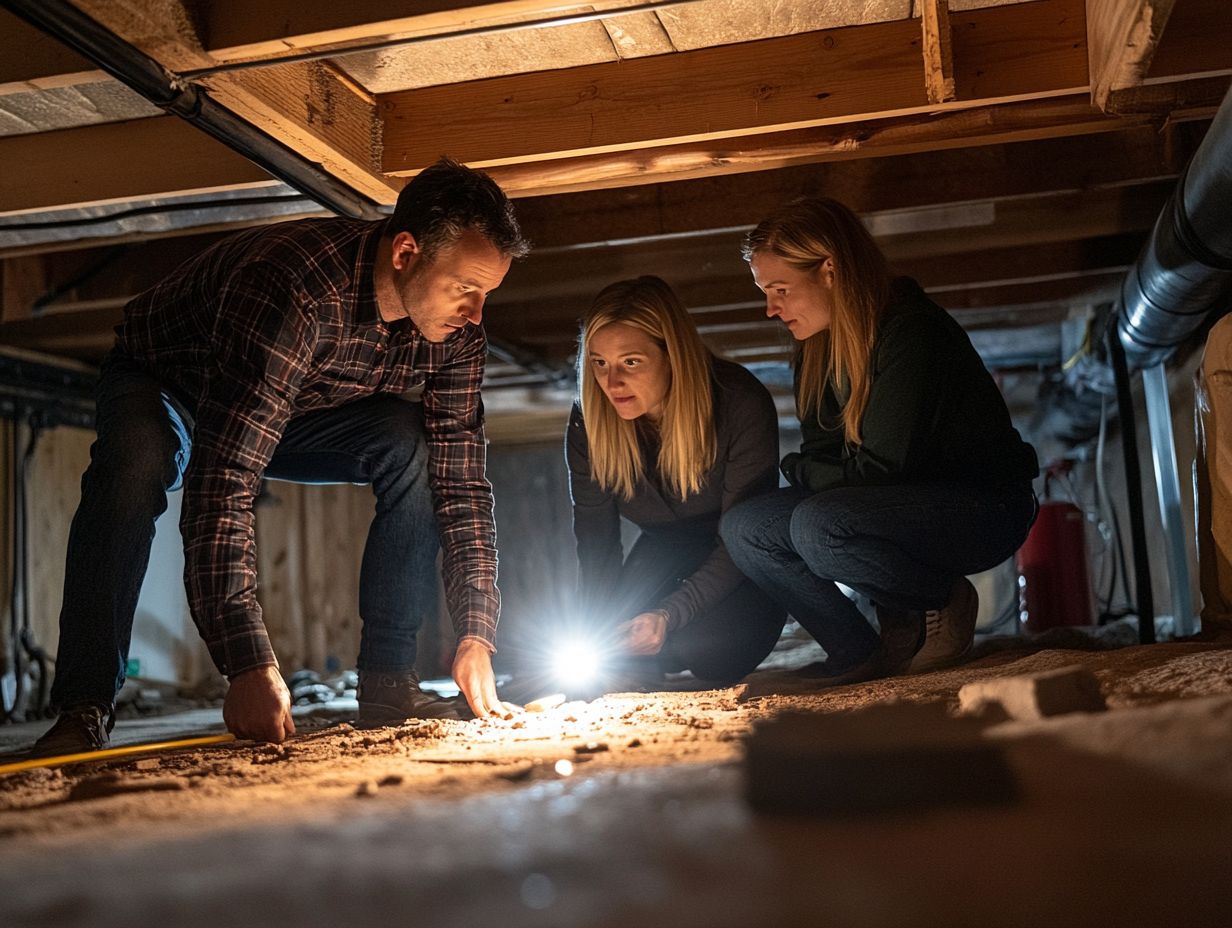
A buyer should schedule a home inspection as soon as possible after their offer has been accepted. Understanding the role of home inspections for first-time buyers allows enough time for any necessary repairs or negotiations before the closing date.
Who typically pays for the home inspection?
Generally, the buyer is responsible for paying for the home inspection. However, some sellers may choose to cover the cost as a courtesy or negotiation tactic.
What does a home inspection cover?
A home inspection typically covers the condition of the property’s structural components, major systems such as HVAC and plumbing, and any potential safety hazards. It may also include an examination of the roof, foundation, and exterior of the home.
Can a home inspection affect the purchase price?
Yes, a home inspection can potentially affect the purchase price. If the inspection reveals significant issues, the buyer may be able to negotiate a lower price or request that the seller make necessary repairs before finalizing the purchase.
What happens if the home inspection uncovers major issues?
If the home inspection reveals major issues, the buyer has a few options. They can negotiate with the seller to make repairs or lower the purchase price, ask for a credit towards future repairs, or choose to walk away from the deal altogether.

